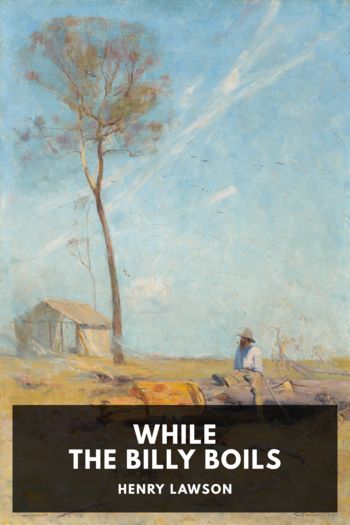While the Billy Boils - Henry Lawson (the kiss of deception read online .TXT) 📗

- Author: Henry Lawson
Book online «While the Billy Boils - Henry Lawson (the kiss of deception read online .TXT) 📗». Author Henry Lawson
One or two rose occasionally and rooted in the dust-boxes on the pavement outside the shops—but they didn’t seem to get anything. They were feeling “peckish,” no doubt, and wanted to see if they could get something to eat before the corporation carts came along. So did the rats.
Some men can’t sleep very well on an empty stomach—at least, not at first; but it mostly comes with practice. They often sleep forever in London. Not in Sydney as yet—so we say.
Now and then one of our outcasts would stretch his cramped limbs to ease them—but the cold soon made him huddle again. The pavement must have been hard on the men’s “points,” too; they couldn’t dig holes nor make soft places for their hips, as you can in camp out back. And then, again, the stones had nasty edges and awkward slopes, for the pavements were very uneven.
The Law came along now and then, and had a careless glance at the unemployed in bed. They didn’t look like sleeping beauties. The Law appeared to regard them as so much rubbish that ought not to have been placed there, and for the presence of which somebody ought to be prosecuted by the Inspector of Nuisances. At least, that was the expression the policeman had on his face.
And so Australian workmen lay at two o’clock in the morning in the streets of Sydney, and tried to get a little sleep before the traffic came along and took their bed.
The idea of sleeping out might be nothing to bushmen—not even an idea; but “dossing out” in the city and “camping” in the bush are two very different things. In the bush you can light a fire, boil your billy, and make some tea—if you have any; also fry a chop (there are no sheep running round in the city). You can have a clean meal, take off your shirt and wash it, and wash yourself—if there’s water enough—and feel fresh and clean. You can whistle and sing by the campfire, and make poetry, and breathe fresh air, and watch the everlasting stars that keep the mateless traveller from going mad as he lies in his lonely camp on the plains. Your privacy is even more perfect than if you had a suite of rooms at the Australia; you are at the mercy of no policeman; there’s no one to watch you but God—and He won’t move you on. God watches the “dossers-out,” too, in the city, but He doesn’t keep them from being moved on or run in.
With the city unemployed the case is entirely different. The city outcast cannot light a fire and boil a billy—even if he has one—he’d be run in at once for attempting to commit arson, or create a riot, or on suspicion of being a person of unsound mind. If he took off his shirt to wash it, or went in for a swim, he’d be had up for indecently exposing his bones—and perhaps he’d get flogged. He cannot whistle or sing on his pavement bed at night, for, if he did, he’d be violently arrested by two great policemen for riotous conduct. He doesn’t see many stars, and he’s generally too hungry to make poetry. He only sleeps on the pavement on sufferance, and when the policeman finds the small hours hang heavily on him, he can root up the unemployed with his big foot and move him on—or arrest him for being around with the intention to commit a felony; and, when the wretched “dosser” rises in the morning, he cannot shoulder his swag and take the track—he must cadge a breakfast at some back gate or restaurant, and then sit in the park or walk round and round, the same old hopeless round, all day. There’s no prison like the city for a poor man.
Nearly every man the traveller meets in the bush is about as dirty and ragged as himself, and just about as hard up; but in the city nearly every man the poor unemployed meets is a dude, or at least, well dressed, and the unemployed feels dirty and mean and degraded by the contrast—and despised.
And he can’t help feeling like a criminal. It may be imagination, but every policeman seems to regard him with suspicion, and this is terrible to a sensitive man.
We once had the key of the street for a night. We don’t know how much tobacco we smoked, how many seats we sat on, or how many miles we walked before morning. But we do know that we felt like a felon, and that every policeman seemed to regard us with a suspicious eye; and at last we began to squint furtively at every trap we met, which, perhaps, made him more suspicious, till finally we felt bad enough to be run in and to get six months’ hard.
Three winters ago a man, whose name doesn’t matter, had a small office near Elizabeth Street, Sydney. He was an hotel broker, debt collector, commission agent, canvasser, and so on, in a small way—a very small way—but his heart was big. He had a partner. They batched in the office, and did their cooking over a gas lamp. Now, every day the man-whose-name-doesn’t-matter would carefully collect the scraps of food, add a slice or two of bread and butter, wrap it all up in a piece of newspaper, and, after dark, step out and leave the parcel on a ledge of the stonework outside the building in the street. Every morning it would be gone. A shadow came along in the night and took it. This went on for many months, till at last one night the





Comments (0)